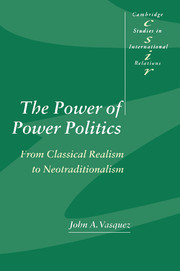Book contents
- Frontmatter
- Contents
- List of figures
- List of tables
- Preface
- Introduction
- Part I The Original Text: Classical Realism and Quantitative International Politics
- Preface to Part I
- Acknowledgments
- 1 The role of paradigms in scientific inquiry: a conceptual framework and a set of principles for paradigm evaluation
- 2 The role of the realist paradigm in the development of a scientific study of international relations
- 3 Research design: defining and operationalizing the realist paradigm
- 4 Theory construction as a paradigm-directed activity
- 5 Data making as a paradigm-directed activity
- 6 Research as a paradigm-directed activity
- 7 Evaluation: the adequacy of the realist paradigm
- 8 Theory and research in the 1970s: the emerging anomalies
- Part II Neorealism and Neotraditionalism: International Relations Theory at the Millennium
- References
- Name index
- Subject index
- CAMBRIDGE STUDIES IN INTERNATIONAL RELATIONS
Preface to Part I
Published online by Cambridge University Press: 22 September 2009
- Frontmatter
- Contents
- List of figures
- List of tables
- Preface
- Introduction
- Part I The Original Text: Classical Realism and Quantitative International Politics
- Preface to Part I
- Acknowledgments
- 1 The role of paradigms in scientific inquiry: a conceptual framework and a set of principles for paradigm evaluation
- 2 The role of the realist paradigm in the development of a scientific study of international relations
- 3 Research design: defining and operationalizing the realist paradigm
- 4 Theory construction as a paradigm-directed activity
- 5 Data making as a paradigm-directed activity
- 6 Research as a paradigm-directed activity
- 7 Evaluation: the adequacy of the realist paradigm
- 8 Theory and research in the 1970s: the emerging anomalies
- Part II Neorealism and Neotraditionalism: International Relations Theory at the Millennium
- References
- Name index
- Subject index
- CAMBRIDGE STUDIES IN INTERNATIONAL RELATIONS
Summary
This book is concerned with two aspects of the power of power politics. The first deals with the ability of power politics perspectives to dominate the field of international relations inquiry; that is, to guide and direct the theory and research of most of the practitioners of the discipline. The second deals with the ability of power politics to explain phenomena adequately. Although power politics “theory”; can be found as far back as the ancient civilizations of Greece, India, and China, this analysis will deal only with its twentieth-century manifestation, the realist paradigm. This book will seek to demonstrate two controversial claims: that the realist paradigm has dominated the field of international relations since the early 1950s, and that this paradigm has not been very successful in explaining behavior.
The analysis has a descriptive and an evaluative component. In its descriptive section it will demonstrate empirically that the realist paradigm has indeed dominated the field. This will be accomplished by showing that the paradigm has guided theory construction, data making, and research. In its evaluative section it will demonstrate that the realist paradigm has been a scientifically inadequate approach for explaining behavior in international relations. This will be accomplished by applying criteria of adequacy for paradigm and theory evaluation developed by various philosophers of science. The major criterion to be employed is that paradigms, in order to be adequate, must produce significant findings after a reasonable period of time and research.
The analysis presented here is important for two reasons.
- Type
- Chapter
- Information
- The Power of Power PoliticsFrom Classical Realism to Neotraditionalism, pp. 13 - 16Publisher: Cambridge University PressPrint publication year: 1999

